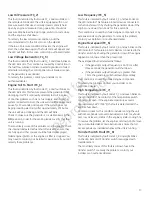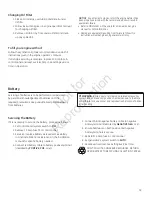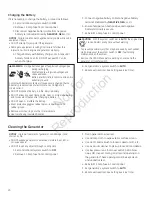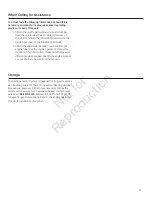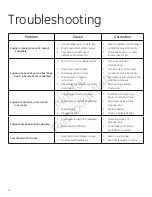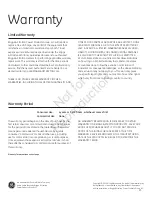
8
Power Decrease at High Altitude or
High Temperature
Air density is less at high altitudes, resulting in less available
engine power. Specifically, engine power will decrease 3.5%
for each 1,000 feet (300 meters) above sea level and 1%
for each 10° F (5.6°C) above 77°F (25°C). Make sure you and
your installer consider these factors when determining total
generator load.
An important consideration affecting the entire installation
is the type of fuel used by your home generator. The system
was factory tested and adjusted using either natural gas or
liquid propane (LP vapor). For proper engine function, factors
that are inherent to each of these fuels, your location and
the duration of possible utility interruptions are important
considerations in the following fuel guidelines:
• Use clean, dry fuel, free of moisture or any
particulate material. Using fuels outside the
following recommended values may cause
performance problems.
• In engines set up to run on propane (LP), commercial
grade HD5 propane with a minimum fuel energy of
2500 BTUs/ft3 with maximum propylene content of
5% and butane and heavier gas content of 2.5% and
minimum propane content of 90%.
Natural gas rating will depend on specific fuel but typical
derates are between 10 to 20% off the LP gas rating.
Fuel Factors
WARNING
Propane and Natural Gas are extremely flammable
and explosive.
Fire or explosion can cause severe burns or death.
The residential generator is equipped with an automatic safety
•
gas “fuel shut-off” valve.
DO NOT operate the equipment if the “fuel shut-off” valve is
•
missing or inoperative.
gaseous fuel supply increases, and the number of 90 degree
bends in the fuel supply increases; compensations in piping
and wiring materials must be made. This is necessary to
comply with local codes and overcome electrical voltage
drops and gaseous fuel pressure drops.
The factors mentioned above will have a direct affect on
the overall price of your home generator installation.
In some areas you may need to acquire electrical permits for
installing the home generator, building permits for installing
gas lines, and permits for noise allowances. Your installer
should check your local codes AND obtain the permits before
installing the system.
This section provides home generator owners with the
information necessary to achieve the most satisfactory and
cost effective installation possible.
The illustrations are for typical circumstances and are meant
to familiarize you with the installation options available with
your home generator. A thorough understanding of these
options will provide fundamental control over the cost of
your installation, as well as ensure your final satisfaction
and security.
Federal and local codes, appearance, noise levels, fuel types,
and distances are the factors that must be considered when
negotiating with an installation professional. Remember
that as the distance from the existing electrical service and
Owner Orientation
Not
for
Reproduction

















